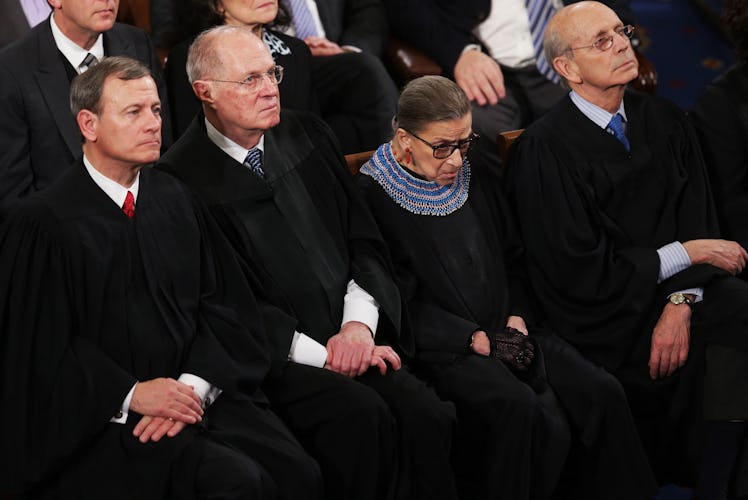
Ruth Bader Ginsburg Has Better Things To Do Than See Trump's State Of The Union
On Tuesday, Jan. 30, Donald Trump is giving his first State of the Union (SOTU) address as President of the United States. Typically, the State of the Union is attended by a majority of politicians in Congress as well as the Supreme Court, so all three branches of government are represented. This year, however, one very significant Supreme Court justice is missing, as Ruth Bader Ginsburg is skipping the State of the Union.
Ginsburg's absence on Tuesday night is technically due to a simple scheduling issue. Back in August, according to Newsweek, she was scheduled to give a "fireside chat" at the Roger Williams University School of Law in Rhode Island. She'll be joined at that chat by First U.S. Circuit Court of Appeals Senior Judge Bruce M. Selya. After that chat, Ginsburg will be giving a talk at a synagogue in Providence, Rhode Island, according to CNN.
"The objective will be to give her an opportunity to expound on matters that will be of interest to law students and law faculty, to talk about how she goes about her job, and to offer reflections on her life experience," Selya said in a press release about the fireside chat in August. That talk is open to students, while the synagogue event is open to members-only.
While it's typical for some members of the Supreme Court to attend the State of the Union, not every justice goes every year, so it's not totally unusual for Ginsburg to be skipping out on it this time around. Justice Antonin Scalia, who died in 2016, skipped the State of the Union address for about 20 years, according to CNN. He once referred to the State of the Union speeches as "cheerleading sessions," so clearly, he wasn't the biggest fan of the annual event.
This is also not the first major event of Trump's presidency that Ginsburg is skipping. Although this is Trump's first State of the Union, he gave a joint congressional address in February 2017. Justice Ginsburg skipped that one along with Justices Samuel Alito and Clarence Thomas. She did, however, attend Trump's inauguration in January 2017.
It's well-documented that Ginsburg does not particularly like Trump. In a July 2016 interview with The New York Times, Ginsburg said she couldn't "imagine what this place would be — I can’t imagine what the country would be — with Donald Trump as our president." She added that while for the U.S., a Trump presidency would only be four years, it would have a much longer impact on the Supreme Court. Indeed, as president, Trump successfully nominated conservative Neil Gorsuch to the Supreme Court. Supreme Court appointments do not have term limits.
Never one to take negative comments with a grain of salt, Trump went after Ginsburg for her comments in July 2016, calling them "highly inappropriate" and "a disgrace to the court." Ginsburg later apologized for her comments in a statement, calling them "ill advised."
It's understandable why Trump and Ginsburg would be adversaries. Ginsburg is a lifelong feminist who is proud of her Jewish heritage and has supported women's rights as a progressive member of the Supreme Court. Trump, meanwhile, is a non-feminist who has worked to take away women's rights as president and has been criticized for his rhetoric around the Jewish community.
It appears as if Trump will just have to deal with Ginsburg's presence throughout his presidency, however. On Jan. 21, Ginsburg said her health is "very good" and added that she's planning to stay in her position on the Supreme Court "as long as I can do the job full steam." Earlier in January, it was reported that she had hired law clerks through 2020, so clearly she's not joking around about staying where she is. For that, many women across the country are grateful.